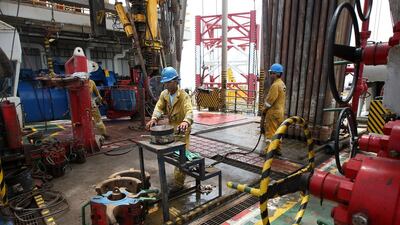The Middle East remains an oasis of stability in the oil and gas jobs market, even as the oil price rout in the past few months has taken its toll on the industry worldwide, according to the head of oil and gas at Hays, the recruitment consultant.
Hays, in its global quarterly oil and gas jobs survey released today, says a fairly buoyant market for skilled personnel across the board in last year’s fourth quarter has since turned sour after a large number of international oil companies have announced swingeing cuts to their capital spending budgets and broad-based layoffs.
“The Middle East, however, has been relatively protected,” says Gary Ward, the Abu Dhabi-based head of Hays Middle East and the head of its oil and gas unit worldwide.
“Most of the big international oil companies have announced that they are not going ahead with some [development] programmes and will be making redundancies, but the Middle East is not seeing any of that,” at least for projects under way, Mr Ward says.
In the Middle East, therefore, there is not the same downwards pressure on salaries, but remuneration is expected to flatline in the coming year and perhaps beyond if oil prices stay in the US$50 to $70 per barrel range, which is assumed by several major forecasters.
The Hays survey was carried out in November, when oil prices had begun to fall from the average of above $100 during the past four years but had not yet begun the steepest part of their descent. Consequently, the survey reflects the more optimistic mood that had prevailed for most of the year, including the expectation among a large majority (about 85 per cent) of at least a modest increase in salary.
The evidence in the past couple of months, however, has run counter to that, Hays said.
Taking offshore drilling as an example, the recruitment company said this market could deteriorate further because of weak demand and a flood of new vessels. Rig rates have fallen sharply over the past 18 months as oil companies cut capital spending just as dozens of new offshore rigs ordered during the boom come on line. Day rates for most advanced ultra-deep rigs, which peaked at $650,000 per day last year, are now down to $375,000 to $500,0000.
The specific jobs that are being affected depend on the region, Mr Ward said. In Mexico, for example, the country had been looking to attract international oil companies after it opened up its sector to foreign investment. But international oil companies have cooled on potential projects in Mexico’s offshore oil sector as they re-prioritise budgets, and it is the exploration and production (E&P) sector there that has suffered.
But in the mature North Sea area, where there is little new E&P, operating budgets have come in for cuts, affecting a different group of skilled workers.
The situation could be an opportunity for companies in the Middle East – especially in the more stable GCC countries, including the UAE – to secure skilled workers in the areas needed for development over the next several years, Mr Ward said.
In the UAE, this includes both offshore and onshore oil and gasfield developments that are aiming to boost oil production to 3.5 million barrels per day using the latest techniques. There is also an ambitious programme to produce more domestic gas by capturing it for use in electricity generation, and reinjecting carbon dioxide into oilfields instead.
“If the GCC countries do it right, then in the current economic environment skilled workers in the sector will be looking at the region in a completely different way,” Mr Ward says.
Part of attracting skilled oil and gas workers to the region is recognising what lures them apart from basic salary.
Mr Ward said that the latest Hays survey identified health care as the No 1 non-salary priority for the first time since the the company began taking the poll.
It is run a close second by bonuses, perhaps reflecting the worry that extra compensation is the first thing employers cut in tough times. The third-most important element of the package, running close to the top two, is home leave allowances. Coming a distant fourth, surprisingly, is housing allowance, although this would be likely to run much higher for countries such as the UAE that have a predominantly expatriate workforce in the sector.
The Hays report also looked at skill shortages and asked industry respondents – which included a much larger sample size than previous reports, including a bigger proportion of women – of the main reasons behind it. The top two answers were bad “succession planning”, which means the transfer of knowledge from one generation to the next, followed by a dearth of new professionals entering the industry.
This is especially the case for the UAE, where most of the work in the industry has previously been done by an expatriate workforce; it is only recently that qualified Emiratis have been coming through the system in great numbers.
amcauley@thenational.ae
Follow The National's Business section on Twitter

